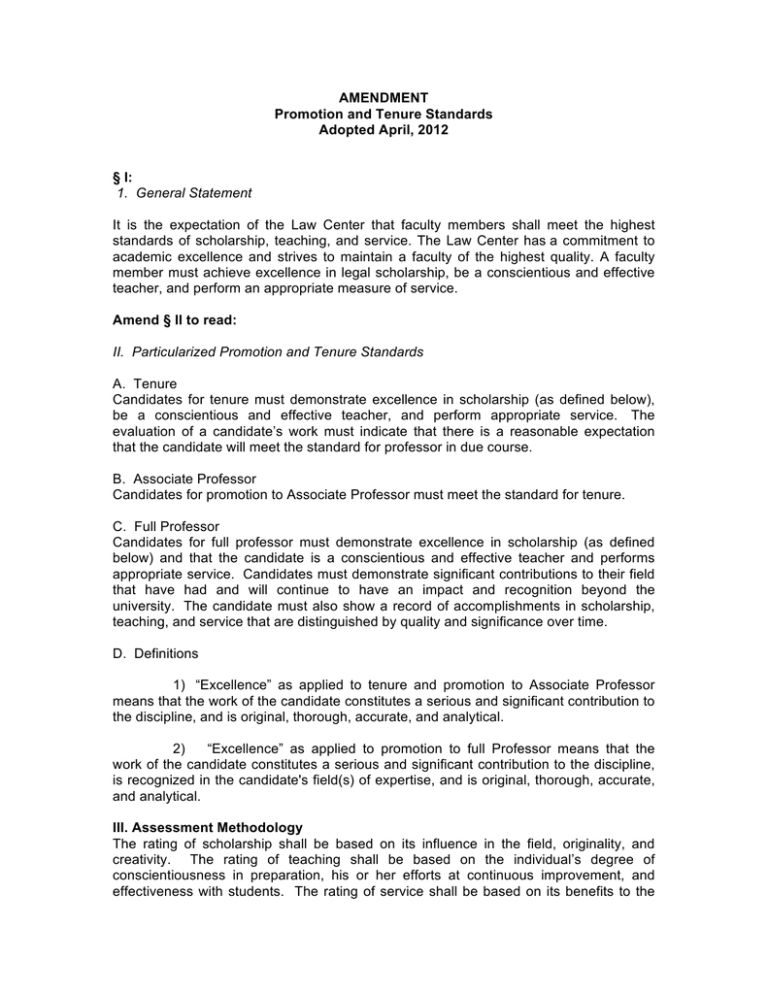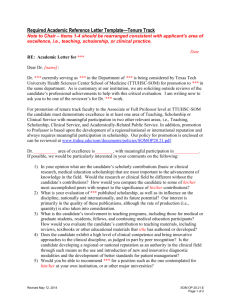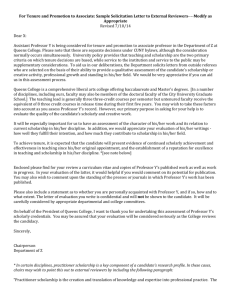AMENDMENT Promotion and Tenure Standards Adopted April, 2012 § I:
advertisement

AMENDMENT Promotion and Tenure Standards Adopted April, 2012 § I: 1. General Statement It is the expectation of the Law Center that faculty members shall meet the highest standards of scholarship, teaching, and service. The Law Center has a commitment to academic excellence and strives to maintain a faculty of the highest quality. A faculty member must achieve excellence in legal scholarship, be a conscientious and effective teacher, and perform an appropriate measure of service. Amend § II to read: II. Particularized Promotion and Tenure Standards A. Tenure Candidates for tenure must demonstrate excellence in scholarship (as defined below), be a conscientious and effective teacher, and perform appropriate service. The evaluation of a candidate’s work must indicate that there is a reasonable expectation that the candidate will meet the standard for professor in due course. B. Associate Professor Candidates for promotion to Associate Professor must meet the standard for tenure. C. Full Professor Candidates for full professor must demonstrate excellence in scholarship (as defined below) and that the candidate is a conscientious and effective teacher and performs appropriate service. Candidates must demonstrate significant contributions to their field that have had and will continue to have an impact and recognition beyond the university. The candidate must also show a record of accomplishments in scholarship, teaching, and service that are distinguished by quality and significance over time. D. Definitions 1) “Excellence” as applied to tenure and promotion to Associate Professor means that the work of the candidate constitutes a serious and significant contribution to the discipline, and is original, thorough, accurate, and analytical. 2) “Excellence” as applied to promotion to full Professor means that the work of the candidate constitutes a serious and significant contribution to the discipline, is recognized in the candidate's field(s) of expertise, and is original, thorough, accurate, and analytical. III. Assessment Methodology The rating of scholarship shall be based on its influence in the field, originality, and creativity. The rating of teaching shall be based on the individual’s degree of conscientiousness in preparation, his or her efforts at continuous improvement, and effectiveness with students. The rating of service shall be based on its benefits to the Law Center, University, the legal profession, and the greater community. The phrase “may be shown” as used in the remainder of this document is intended to provide guidance on sources and types of evidence likely to be relevant but is not intended to limit the evidence that may be considered. A. Scholarship Assessment: Assessment of scholarship should include at least the candidate’s books, monographs, journal articles, book chapters, other papers, electronic or interactive scholarly works, and other media evincing scholarly thought and contributing to legal understanding. Assessment may be based on completed works as well as works in press and works accepted for publication. The evaluations of a candidate’s portfolio shall be conducted the law faculty with input from external reviewers. B. Teaching Assessment: Assessment of teaching should include at least: (a) teaching evaluations by students, including any commentary relating to the candidate, along with comparative Law Center data; (b) formal or informal peer assessment of the candidate's teaching effectiveness; (c) course or program development by the candidate (1) course development may be shown by sample course syllabi, teaching-grant proposal abstracts, courseware, cases and simulations, modifications of teaching for instructional television, or internet teaching; (2) program development may be shown by student advising; direction of graduate research; or interdisciplinary program development; (d) the candidate’s facilitation of student success, which may be shown by such factors as assistance to students who have won awards, published scholarly works, obtained internships or judicial clerkships, or otherwise excelled in professional accomplishments; (e) commitment of the candidate to enhancing teaching ability, such as professional development activities, scholarly approaches to evaluating teaching effectiveness, teaching excellence awards, guest lecturing, and team teaching. C. Service Assessment Assessment of service should include at least an examination of contributions to Law Center or institute efforts, to campus-wide activities, to external professional organizations or through involvement with (or advocacy before) law reform organizations or executive, legislative, judicial or administrative bodies. The extent to which the candidate has received other compensation for any such form of service may be taken into account in determining its substantiality.



